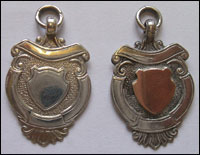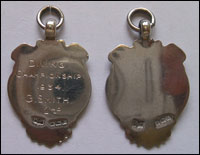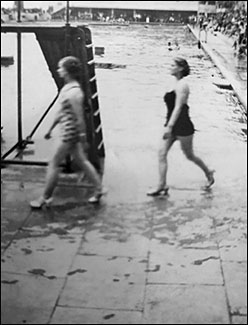|
||||
| From notes made by Kay Collins in conversation with Gladys Holt (nee Smith), 2007 |
||||
|
Gladys Holt (nee Smith)
|
||||
|
Schooldays. I loved school – I went to South End where Benny Jones, a nice man with white hair, was headmaster. Other teachers were Mr Somerlin, Miss Scholes, Mrs Woodhams and Miss Simmons. I was there from age 4 to 14 and remember playing hop-scotch and tic in the school yard with teachers watching over us. We would also do hand stands and loved skipping, but were not allowed to run. It was a Church School originally and had become a National school so was classed as Church of England and this meant we had daily prayers in morning assembly. Two girls and two boys were Roman Catholics so they always left room before prayers were said. All who lived near enough would walk home at dinner-time and back for afternoon lessons, and then when we went home it was often bread and jam for tea. I think just two children lived too far to go home for dinner so they would bring sandwiches for mid-day. In May we would dance round the maypole, and in the summer term we had a district sports day. This was held at the football ground in Hayden Road and teams from all the schools would compete, each wearing a coloured sash to denote their team. A tea was served at the end of the games and Mother would tie my cup and plate inside a large handkerchief for me carry there. Mr Bayes, the baker from Griffith Street, would give all the children a little pork pie, and we’d have sandwiches and jelly and cakes. When I was 11 or 12 I had a bike so I could cycle to school. In the last few years we had cookery lessons or “domestic science”, once a week at the Intermediate School in Hayway, with Miss Vi Dexter. Children who passed the 11+ exams went to the Intermediate or, if their parents could afford to send them, to the Grammar School or High School at Wellingborough. We also learnt country dancing at school. My father My father was a semi-professional boxer and, with Jack Harrison, was paid to travel to America to fight. He put out his hands to touch gloves before they began, as he did in England, but the opponent thought he was starting the fight and threw one punch, knocking him out. So he earned no money, and the two of them returned home by working as stokers on board ship. Father had been a soldier during the Boer War with the Beds & Herts Regiment and in the Great War. Sometimes he’d call in at the Compass Inn – if they’d won, a bath would be filled with ale and they’d all keep dipping in their glass until it was drained. Hare coursing and dog racing was sometimes arranged and took place in Abbott’s field. Father did shoe repairs and was a small holder – kept hens, grew fruit and vegetables - and sold the surplus produce. I would often spend time in the garden, helping him. Swimming & Diving The swimming pool was opened in 1933/4 and from May to October we lived in the water. Bill Elliott was the first and only caretaker of the pool, serving until it closed. He gave lessons and would tie a loose rope, dangling from a stick, around the waist and walk alongside his pupils and lift the stick and rope if he thought they were struggling. It meant they were unimpeded by arm-bands or holding floats. He taught many to swim this way.
Bill Steel, Harry Steel, Geoff Morgan, Dr Greenfield, Mr Capon and Mr Muxlow formed a Swimming Club and I joined. I had taught my self to dive and, aged 17, went to a competition at Ramsgate and won. |
||||
Denis Okins, Don Braybrook, John Colton and Geoff Morgan also organised a water polo team. The swimming club entered a float for the 1959 Carnival with Dolls being the theme. Townsend Carriers (Don Braybrook) lent us a lorry – a Commer Karrier - and the float was built at Higham Park where my husband’s family farmed. It took us a week to construct that float. Marriage When I married William “Bill” Holt we lived at Bencroft Grange, part of Holt Brothers. Whilst working with some cattle one day, my husband was tossed out of the pen and was transported to hospital on a gate that was used to stretcher him out of the farm yard. The doctor asked us if they should operate on his back to try and correct the damage saying “or else he’ll never walk again”. We chose the operation and he spent six months in hospital with both legs in plaster as well as the broken back. Whilst he lay there he had spent much of his time deciding how to improve the farm and transform it to mechanisation. When Bill’s father died, he and his brother Harry decided to reorganise the farm. Harry did the milk and cattle and Bill did the crops, so they decided to break the partnership and for Harry to take on Bencroft Grange and Bill to farm at Higham Park Farm. We needed to collect the deeds from Lloyds Bank, grandma went in and as I sat in the motor outside, I heard an aircraft. It dropped a bomb on the railway bridge, another on Bates’ Fish Shop and another on Alfred Street School. There was rubble everywhere and as we tried to drive away we realised we had a puncture. At Morgan’s shop in Church Street one bomb had not exploded – this was later found to have been caused by someone in the munitions factory where it was made having put a small piece of card under the trigger. This was, I believe quite common. Whilst some work was done to the property at Higham Park, we moved to live in the old bungalow that had been the Matron’s living quarters, next to the old isolation hospital where small pox victims were nursed. It was a prefabricated bungalow known as “The Gap”. The Watts’ family lived in the hospital buildings and ran a wood yard there. I helped on the farm by feeding chickens and packing eggs and would work on the binder gathering hay and then building the haystacks – not a job I liked! At harvest time I would make sandwiches and tea and cakes or scones to feed the workers. During WWII we had 8 Land Army girls who came to help whilst the men were away. Three of them lived in Bencroft Cottages and one lived in the farm, the others came daily to work. One of them stayed on after the war as a house-help and she milked the house cow – I never could get milk from the cow. We also had some German prisoners for about two months but then we had three Italians. They were dropped off each day. The Army requisitioned the farm during a trek to the coast for D Day. They took over the barns at Bencroft for the junior officers, whilst three senior officers stayed in the house and the men were in tents. One of them had tried to go off to visit his mother and was caught as a “deserter” so he was handcuffed to a wheel barrow to allow him to carry on working but not to run away again. |
||||
|
|
||||
|
|
||||
|
|
||||


